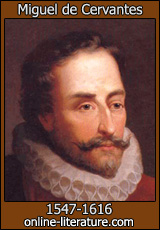 Subscribe for ad free access & additional features for teachers. Authors: 267, Books: 3,607, Poems & Short Stories: 4,435, Forum Members: 71,154, Forum Posts: 1,238,602, Quizzes: 344
Subscribe for ad free access & additional features for teachers. Authors: 267, Books: 3,607, Poems & Short Stories: 4,435, Forum Members: 71,154, Forum Posts: 1,238,602, Quizzes: 344
Summary Chapter 55
Don Quixote can't believe there is a book alaredy written about him, for he has just started. He believes some sage is responsible, though he doesn't know if it is a friend or foe. He doesn't trust it, since it was written by a Moor. He worries the man might have insulted his love affair with Dulcinea.
Sancho returns with the man who told him the book, a bachelor called Samson Carrasco. Don Quixote asks if it is true there is a book about him. Samson says there is, and that it has been printed in several countries. It is very popular. Sancho points out some of the inaccuracies, but Carrasco says they aren't very important (such as Dulcinea being called Dona).
Don Quixote asks which deeds of his are written about in the book. Carrasco says that people vary in which deeds they prefer to hear about. Some like the adventure with the windmills, others like the fulling mills story, etc. The author detailed their highs and lows.
Sancho remarks that poets tend to embellish and tell lies, whereas historians tend to be more accurate in their accounts. Samson tells Sancho that he is also mentioned in the book. He is generally considered credulous for believing Don Quixote's promises.
Samson says there are some criticisms about the book. Some didn't like the insertion of "The Ill-advised Curiosity", which had nothing to do with Don Quixote. Don Quixote says the author was an ignorant chatterer who told the story in a disorganized way.
Samson counters that despite that, it is very popular with all ages and classes. Quixote comments that all great works, particularly popular ones, are more scrutinized and receive more criticism. Carrasco wishes that critics wouldn't gripe about small flaws.
Carrasco mentions there are also omissions. People wonder who the thief was that stoled Sancho's Dapple. They wonder how Sancho gets his donkey back later. It also doesn't mention what Sancho did with the crowns he found in the valise.
Sancho says he'll answer these questions, but he has to return home. Quixote invites Carrasco to stay, which he accepts. They talk and dine. Sancho returns and rejoins the conversation.
| Art of Worldly Wisdom Daily In the 1600s, Balthasar Gracian, a jesuit priest wrote 300 aphorisms on living life called "The Art of Worldly Wisdom." Join our newsletter below and read them all, one at a time. |
Sonnet-a-Day Newsletter Shakespeare wrote over 150 sonnets! Join our Sonnet-A-Day Newsletter and read them all, one at a time. |
